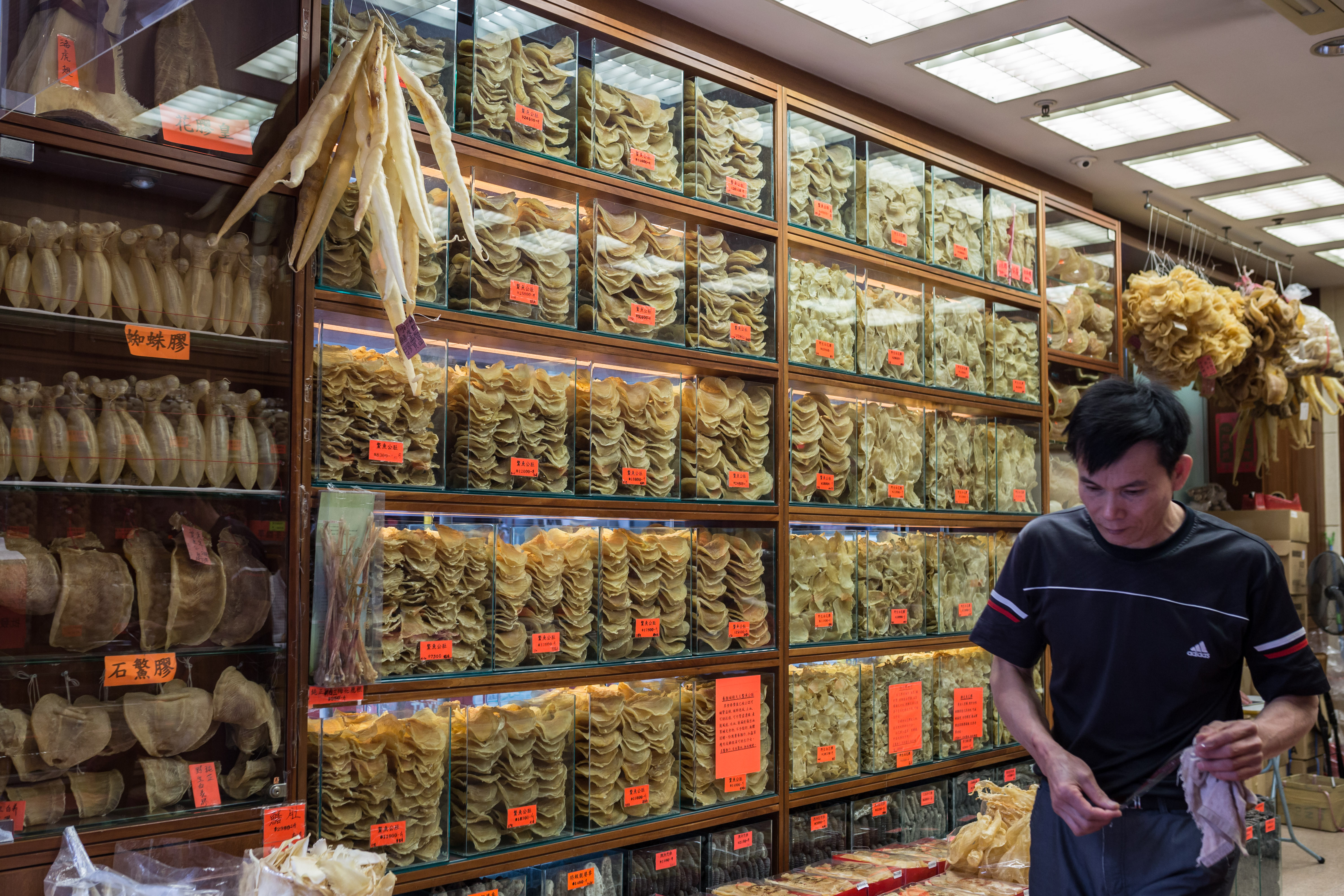
(FILES)In this file photo taken on March 29, 2016 shows an employee walking past cabinets containing different varieties of dried fish maws and shark fins (top L) in Hong Kong. – For years, Asian demand for a dried fish bladder prized as a culinary delicacy — and purported aphrodisiac — has been a boon to French Guiana’s fishing industry, but officials are racing to rein in the market over fears the species will soon be endangered.The acoupa weakfish, found along the sandy bottom of the ocean off the coast of the Caribbean territory, has long been an important catch and often features on local restaurant menus. (Photo by ANTHONY WALLACE / AFP)
CAYENNE, French Guiana — For years, Asian demand for a dried fish bladder prized as a culinary delicacy — and purported aphrodisiac — has been a boon to French Guiana’s fishing industry, but officials are racing to rein in the market over fears the species will soon be endangered.
The acoupa weakfish, found along the sandy bottom of the ocean off the coast of the Caribbean territory, has long been an important catch and often features on local restaurant menus.
But it is the swim bladder, an opaque organ that lets the acoupa control its buoyancy, that has fostered a thriving illegal trade, now attracting hunters from neighboring countries.
Dried and ground into a powder, the swim bladder is “highly appreciated in Asia, one of the seven dishes of the Chinese emperors — in China it’s a little bit like truffles,” said Bruno Morin, deputy director of Guiana’s maritime administration.
Besides its reputation for boosting sexual energy, the bladder is also used to enhance a variety of soups and other dishes, and can even be found in cosmetics.
Demand has soared in recent years after overfishing of the totoaba — a Gulf of California fish, also reputed for medicinal virtues in China — prompted it to be declared an endangered species.
Five years ago, fresh acoupa bladders sold for 40 to 45 euros a kilo ($20-22 per pound), “but now we’re at 170 to 180 euros,” Morin told AFP in the capital, Cayenne.
And prices for dried bladders can reach 1,000 euros or more.
‘Stampede’
It takes some 30 kilos of acoupa to obtain just one kilo of bladders.
The organ did not used to find buyers at fish stalls but the soaring Asian demand has drawn fierce competition in Guiana’s waters from armed poachers from Suriname or Brazil seeking what has been termed the “cocaine of the seas.”
“It’s a stampede,” said shipowner Nicolas Abchee, “but it’s a market that should benefit us Guianans” and not foreign competitors.
Authorities are now regularly checking boats for illicit hauls, with one interception of a Brazilian boat in June leading to the seizure of 12 kilos of bladders.
Michel Nalovic, of the Guiana fisheries’ association, said that local fishermen had been reporting acoupa yield declines of up to 27 percent from last year.
“We can’t kill the goose that lays the golden egg,” Nalovic said.
Morin, of the maritime administration, said that most fishermen don’t declare to the taxman any of the profits from acoupa bladder sales — which generate 70 to 80 percent of their revenue.
But, he said: “Our goal is to make the bladder an economic boon for Guiana.”
“Since people are earning their livelihoods with it, we might as well do so legally,” Morin added.
Better regulation of the market would encourage shipowners to modernize their fleets and equipment, he said, and could help combat illegal fishing.
“We have foreign fleets that are taking only the bladders, and throwing back the rest of the fish because they’re less profitable,” Nalovic said.
Morin likened the practice to the harvesting of shark fins — also highly valued in Asia.
“We’re really heading towards the risk of resource collapse” that could see acoupa listed as an endangered species, “with all the economic and social impact that would go with it,” he warned. /muf